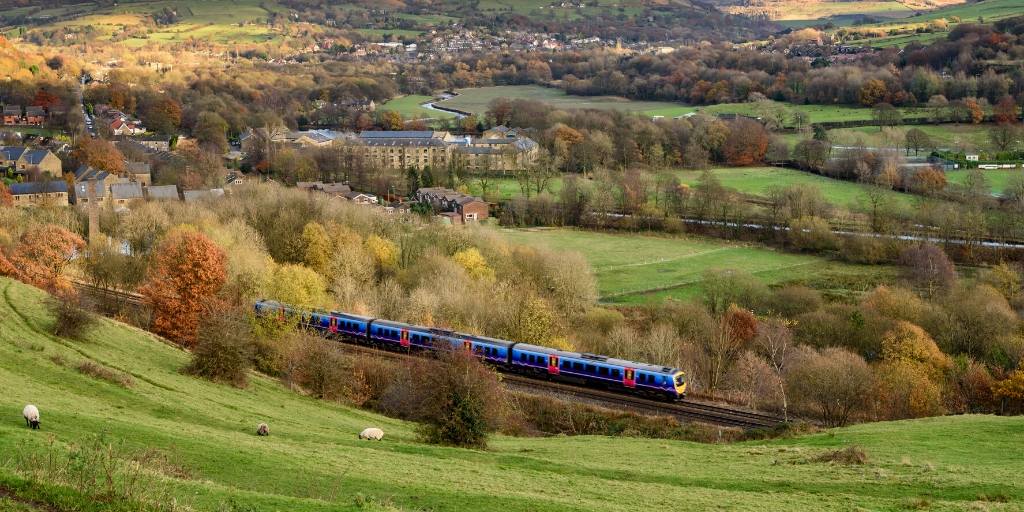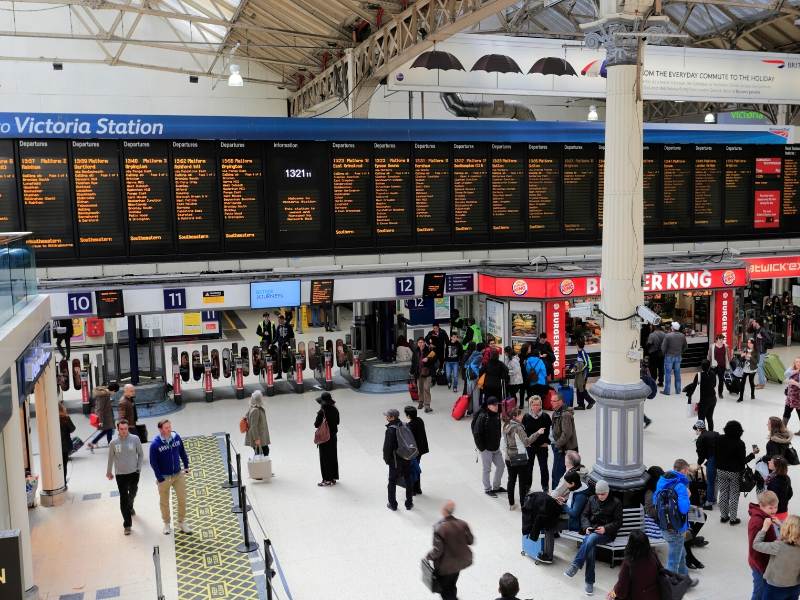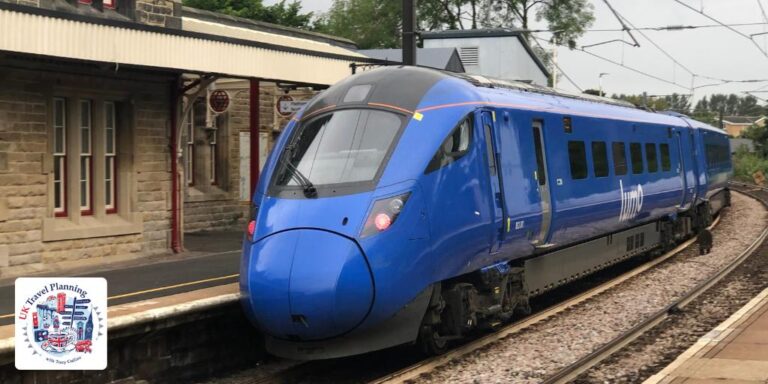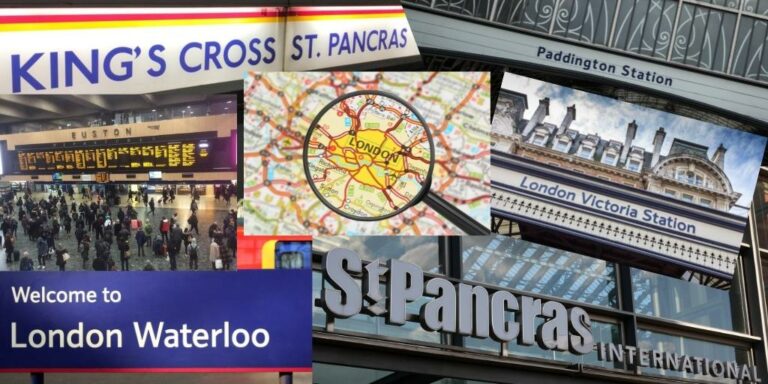9 Essential UK Train Travel Tips (from an expert)
Are you planning to travel the UK by train and are a little nervous or unsure of using an unfamiliar rail system? In this article, we share 9 UK Train Travel Tips for anyone planning to travel by train in the UK. Essential reading to make the most of your UK rail adventure.
Train travel is easy/ everyone knows how to plan a rail trip/ the UK is only small – I have heard this said before but is it true? Whilst the UK is smaller than many countries its rail network is vast and for the inexperienced UK traveller or train traveller, there are quite a number of areas that can prove a challenge.
This cheat sheet consists of 9 tips to train travel in the UK which will help make your UK train travel experience a calmer and more rewarding experience.
I served in the UK rail industry for over 25 years with many job roles ranging from my electrical apprenticeship in train building and project management to working in the railway control. These many roles gave me an in-depth insight into the industry and how good planning with flexibility can overcome many rail travel obstacles.
In addition, as a hobby, I have travelled extensively over the entire network of train lines through England, Wales, Scotland and some in Ireland and have a great deal of experience in travelling through all seasons of the year, days of the week and times of the day.
With so many beautiful cities and towns to visit in the UK, taking a day trip on a train can be a great way to see more of the country and tick off UK bucket list destinations. Or why not plan an entire itinerary, travelling the UK by trail? My best of Britain itinerary by rail includes 14 days of sightseeing Britain by train and takes you across 3 countries and 7 top destinations.
Though the UK is relatively small, 9,848 miles of train track (15,849 km) are tightly packed in some areas, such as London, meaning an advanced plan of travel is an absolute must.
In addition to this cheat sheet, we recommend reading our Guide to UK Train Travel, which includes detailed information about ticket options and passes, 12 done-for-you UK rail itineraries, and information about services such as the Eurostar and Caledonian Sleeper.
Complete Guide to UK Train Travel written by Doug Collins
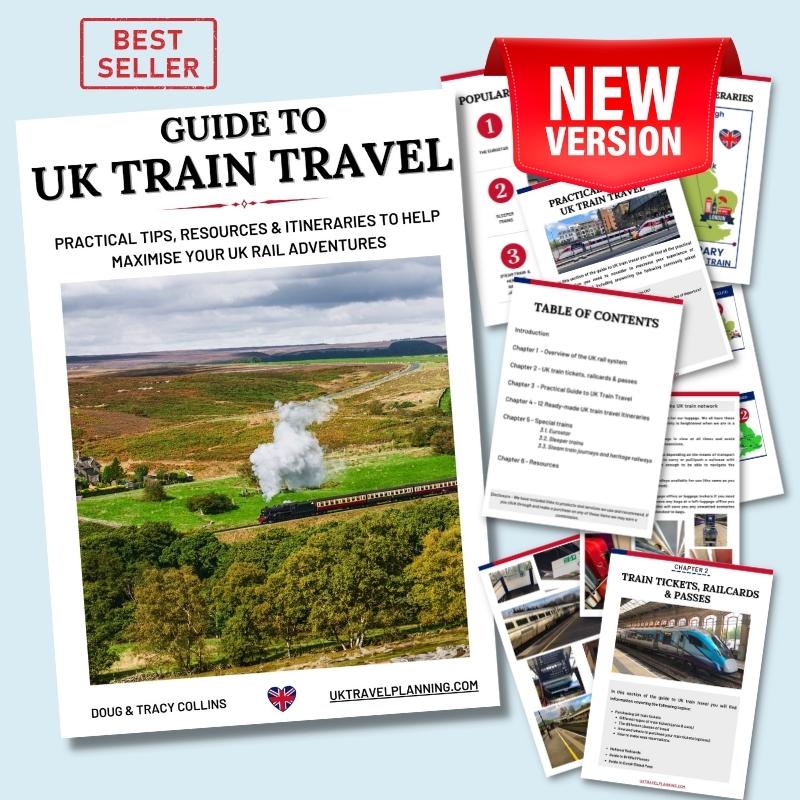

- 9 UK Train Travel Tips
- 1 – Ticket and Pass Travel Tips
- 2 – Doug’s TIP – Railway Station Travel
- 3 – Doug’s TIP – Luggage/Baggage.
- 4 – Doug’s TIP – Seasonal Travel
- Listen to the UK Travel Planning Podcast Episode 2 – Introduction to UK Train Travel with Doug Collins
- 5 – Doug’s TIP – Accessibility
- 6 – Doug’s Tip – Station and/or On-Board WIFI/Charging points
- 7 – Doug’s TIP – Refreshments.
- 8 – Doug’s TIP – Toilets, etc
- 9 – Doug’s TIP – Safety
- Enjoy your UK Train Travel Adventure
9 UK Train Travel Tips
1 – Ticket and Pass Travel Tips
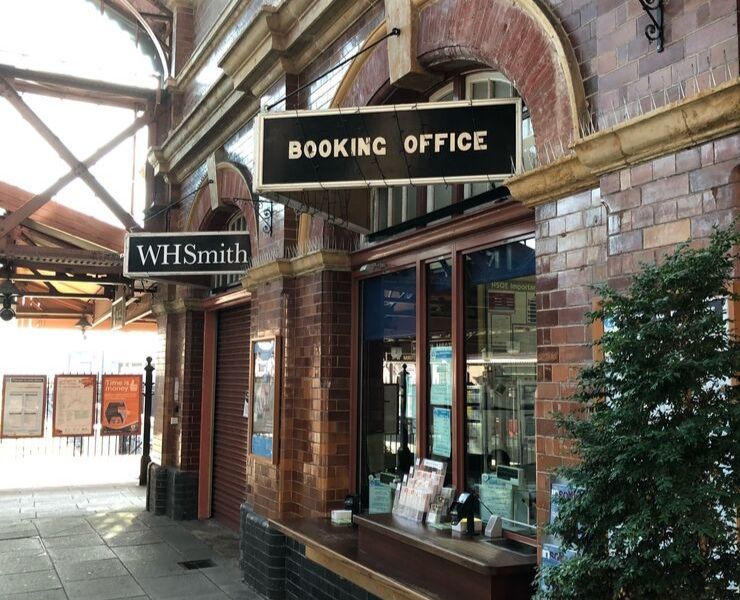

Cost/Options
This is constantly an area that can be problematic and cause confusion/stress for many train travellers in the UK, whether first time or regular train travellers.
With the knowledge of a few facts, the experience can be made a little easier to plan and understand.
The UK passenger railway network service comprises of over 20 private railway companies that ‘aim’ to work as one to ensure passengers can buy the best ticket fare available when they chose to buy the ticket and when they want to travel.
- Different railways companies run trains on the same railway line.
- Tickets/passes can be bought directly from each specific train company or from national rail sale websites such as the Trainline.
- Tickets/passes can still be bought from railway stations, from either ticket offices or ticket machines on the day of travel or in advance, usually up to 12 weeks in advance.
- 3 types of fares generally available include Anytime, Off-Peak and Advance. Each has its own merits
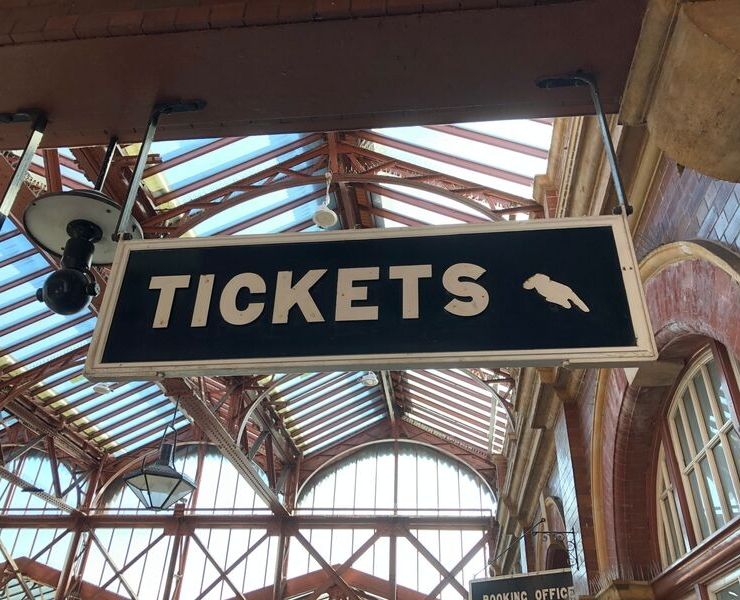

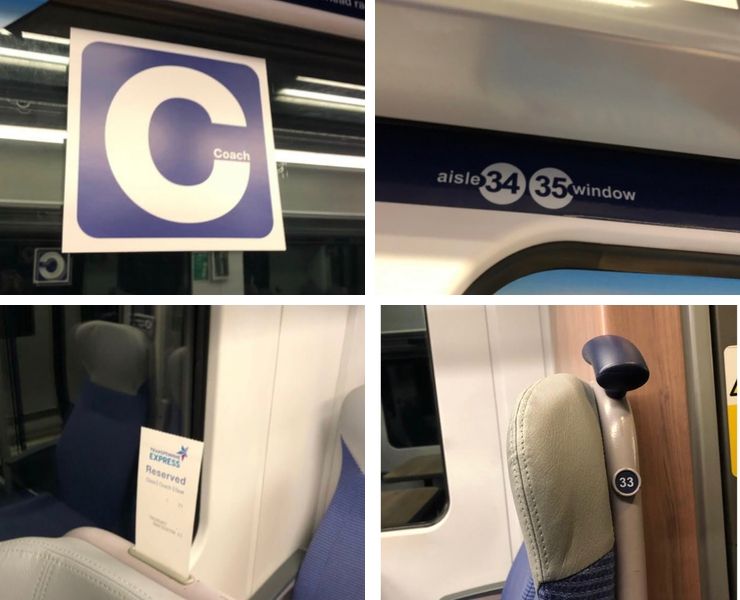

Doug’s TIP:
Consider all ticket/Pass options that best suit your travel plans
(Read – 13 Tips to save money on rail travel in the UK)
This includes:
- Plan your rail itinerary carefully. This will give you the information needed to decide if a rail pass such as a BritRail Pass, Global Eurail Pass, Global Interrail Pass or purchased train tickets are your best option based on duration required, the flexibility of travel and most importantly the cost-benefit option that gives value of money.
- Ensure you have a valid ticket or rail pass before boarding any train.
- Best to keep a form of ID with you also as this may need to be presented if your ticket or Pass has your name printed on.
- Fines and penalties can be given for not having a valid ticket or pass.
- Ask station or platform staff to check your ticket/pass for you if you need help, in my experience station staff are always willing to help.
- Consider the time of day or day of the week when planning your trip.
- Peak travel periods of the day, can be more expensive and busier.
- Peak travel times can vary between train operators.
- Can your journey be delayed until a quieter time to travel off peak travel is generally cheaper?
- Recheck – Journeys planned well in advance; be aware train departure times can change.
- Check your train details the day or so before.
- Often based on track works or incidents.
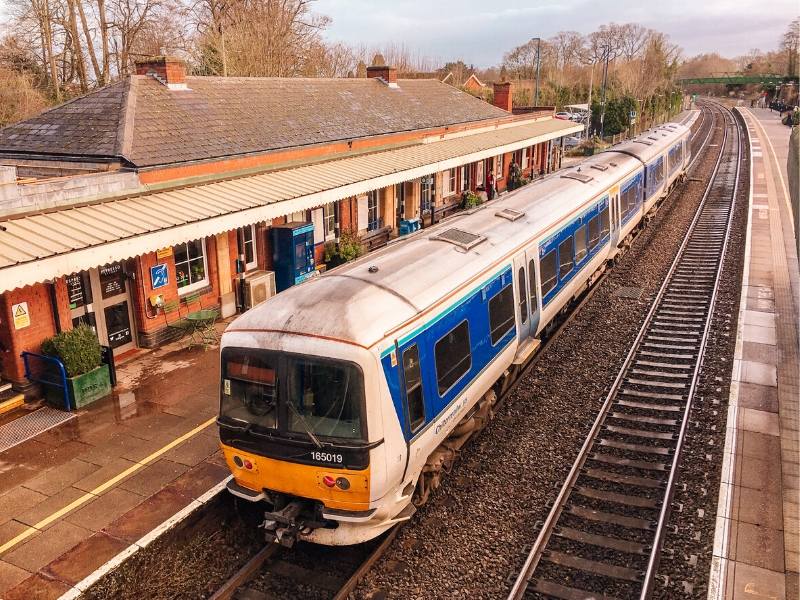

Recommended UK Train Resources
2 – Doug’s TIP – Railway Station Travel
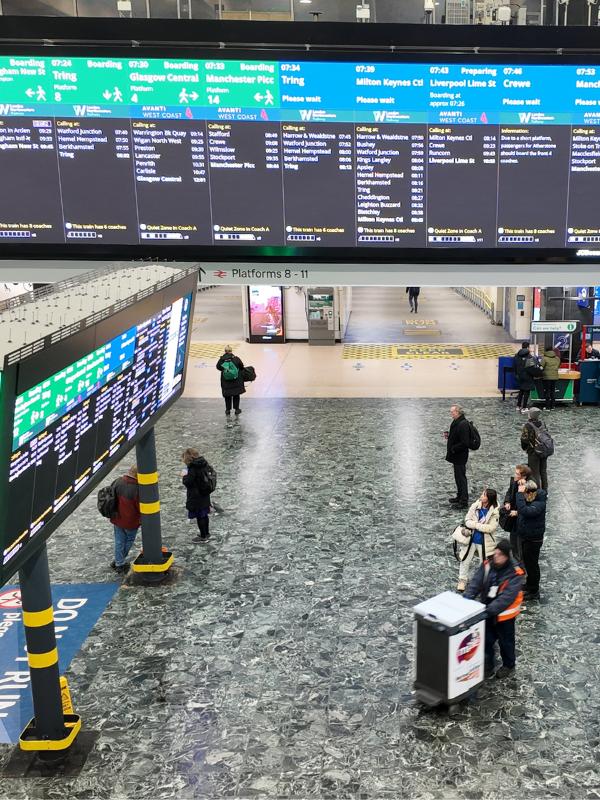

Once travel plans and itineraries have been decided and considered, further research around specific train stations is recommended, not just by UK visitors but also UK travellers. This research will help to reduce any possible anxiety on the day of travel if you consider: –
Station Layout
- Not just for the larger train stations but you need to be look at the layout or the geography of the stations, they often have multiple exits in and out of stations for passengers.
- Be clear which entrance and/or exit is most suitable for your travel plans.
- This is relevant for arriving at the station, by whatever means (see item below) or when your train arrives at your destination and you want to leave the station.
- This could result in a lot of confusion if you cannot find your way around and could mean a lot of unplanned walking, which is not ideal with luggage/baggage, and potentially missing your train.
- Be aware that some cities/towns have more than one principal train station, other than London.
- Birmingham, for example, has three principal railway stations.
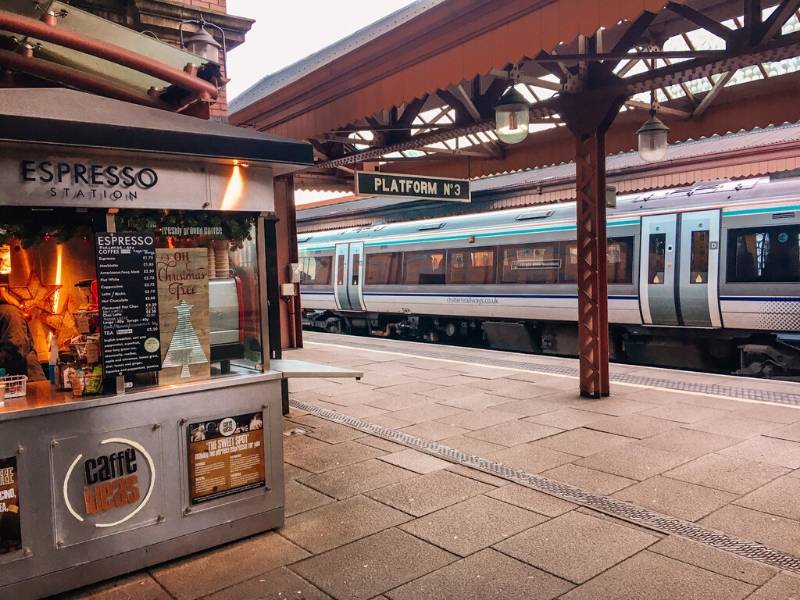

Journey to/from the railway station.
- Plan ahead and allocate plenty of time to get to and from the train station to catch the train or for ongoing travel after arriving at your destination station.
- Plenty of Time – Remember at the station you will have to find your way to the correct platform (or train stop) and if necessary, where to stand to wait for the train (specifically if a seat reservations have been made).
- Consider the travel distance to the station:
- Is there a station closer to you from which a train could be caught, thus reducing your journey time to the station?
- Is the time of the train critical? A later or earlier train may make getting to the station easier, ie, before or after rush hour traffic or congested public transport like buses, tube trains or even taxi availability.
- Further train stations away from accommodation may be more susceptible to weather-affected delays or traffic congestion.
- Transport options—Consider all available modes of transport and the best way to maximise your vacation time, as well as the assistance of friends or family.
- This includes taxis, trams, buses, underground trains, self-drive, river taxis or cruises, and, of course, walking.
- Accommodation location – When planning an itinerary, always consider the location of your accommodation in relation to how close it is to the train station or other transit hub.
- The time to get to the railway station (or other) is ideally kept to a minimum if possible.
- At times, we consider moving accommodation for a single, particularly if we have plans to catch an early train the next morning.
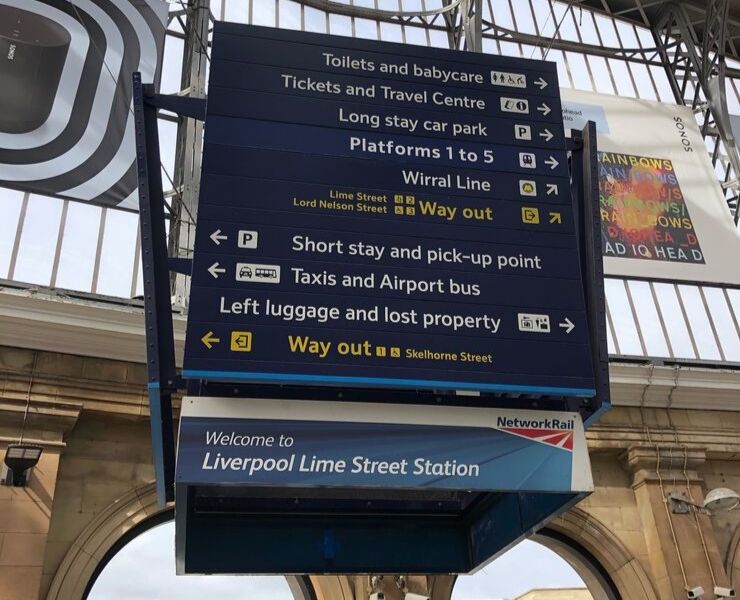

3 – Doug’s TIP – Luggage/Baggage.
How much do I need and how much can I take?
This is a commonly asked question not just applicable to rail travel but also to other modes of transport. Although no limit in regards to luggage size and weight is enforced on UK trains, the following considerations are essential.
Weight/Size
- Can you lift/carry all your luggage onto a train?
- Can you lift and manoeuvre your luggage in/out of luggage racks or overhead storage areas?
- Consider all modes of transport you may need to carry ALL your luggage with you for, mainly when arriving leaving on holiday or if changing accommodation throughout your trip.
- Easy said than done, keep your luggage size to a minimum in terms of weight and size. Smaller bags even when full are easier to lift and stow.
- Use packing lists and secure day/night bags to keep your essential items with you at all times.
- Day Trips- Consider left luggage options at principal train stations if you do not need to carry all your luggage around at all times. Be certain of the cost before undertaking and what times the facility closes if a staffed facility (may be a locker service).
- Consider a service such as “Send My Bag” who will collect and courier your bag to your destination. Certainly worth considering if you have large, heavy suitcases.
4 – Doug’s TIP – Seasonal Travel




Travellers to the UK sometimes forget about the UK seasons, not just the UK temperature variations. Consideration is also required for the time of the year you are planning to travel to the UK.
Depending on specific travel intentions based around date-specific events the number of daylight hours can vary hugely throughout the year, i.e from summer to winter months or Christmas and also to a lesser degree from the south of England to the north of England or Scotland.
Listen to the UK Travel Planning Podcast Episode 2 – Introduction to UK Train Travel with Doug Collins
5 – Doug’s TIP – Accessibility
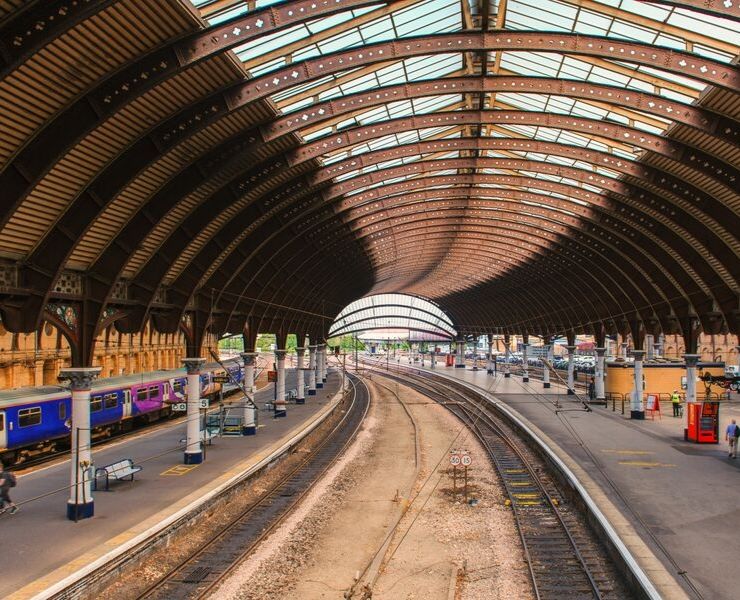

This topic needs to be considered for all individuals in the travel party. It is important to be familiar with all stations in terms of facilities available to all passengers. For example, from the start to the end of your journey do you require access to?
- Lifts?
- Escalators
- Ramps to enter/ leave a train? – at staffed train stations only
- Staff assistance to find a platform or to enter/leave a train?
- Assistance to see/read/hear station announcements and information boards/TV screens. I.e., Arrival/departure boards
- Mobility assistance to board a train
- Check National Rail enquiries for accessibility policies for each rail company and to organise assistance as required. Do not leave this until the last minute but if you arrive at the station and need assistance ask the rail staff who are usually happy to help.
6 – Doug’s Tip – Station and/or On-Board WIFI/Charging points
Plan ahead to ensure you can stay connected. Consider the following:
- Does the station provide free WIFI?
- Does the train(s) operator(s) provide free on board WIFI? Checking if they do is on the entire train or just first class or refreshment cars?
- Are there free station electrical charging sockets/points available for all? Or only in certain train operator departure lounges?
- Is there at seat on board charging points on the train? At all seats on all trains or only certain ones?
- IF IN DOUBT – Bring your own battery charging packs and ensure you make your own arrangement to provide your own WIFI access – leave nothing to chance. Are there phone/device charging sockets on board? Or will you need to provide your own.
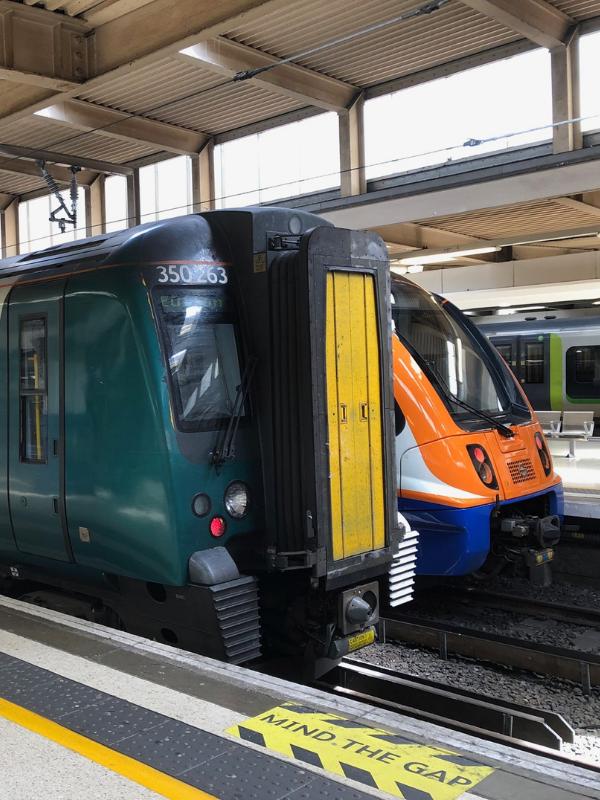

7 – Doug’s TIP – Refreshments.
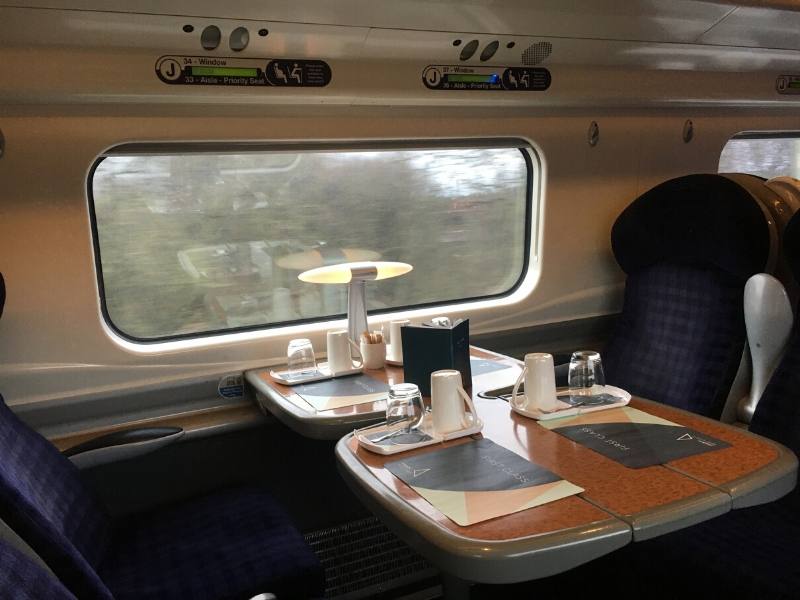



It is easy to take for granted that refreshments will be available throughout our travel. However, experience has shown us that this cannot always be relied upon.
- Though most of the larger stations do have refreshment facilities, the choice of food and drink can be a bit restrictive, even more so on smaller stations, if they have them at all.
- On board trains, those do provide a refreshment car, at-seat service, or a trolley service cannot be relied upon, in choice or availability.
- Station and on-train refreshments may have restricted opening times, eg not available on weekends or public holidays.
- Summary—Do not assume facilities are provided. Where possible, provide your own, particularly on longer trips or during summer months, to keep hydrated. Many of the larger train stations have supermarkets/shops close to the station. If time allows, stock up before arriving at the station.
8 – Doug’s TIP – Toilets, etc
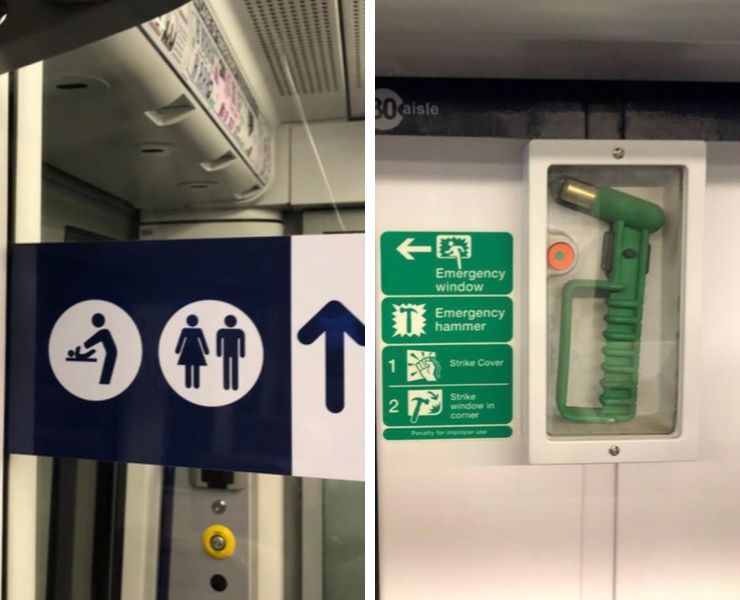

Sensitive topic, but practically needs to be considered.
- Station toilets sometimes have restricted time opening hours or days of the week, ie not available on weekends or public holidays. Usually dependent on whether the station has staff on duty 24/7.
- Generally free of charge to use, but best to be prepared with £1 or £2 in coins.
- Depending on their distance across the country, on-train toilets are available on most but not all services or operators.
- Commuter services sometimes do not – particularly on older trains.
- The condition and the cleanliness of some of these toilets can be less than ideal.
- It is best to bring your own hand wash/gel with you, as it is not unusual for the wash facilities to be out of water or have sinks/taps that do not work.
9 – Doug’s TIP – Safety
- Safety- Be safety aware at all times, extra vigilant regarding own luggage/baggage at train stations and on board all trains.
- Report concerns to station/train staff, the British Transport Police, or call 999.
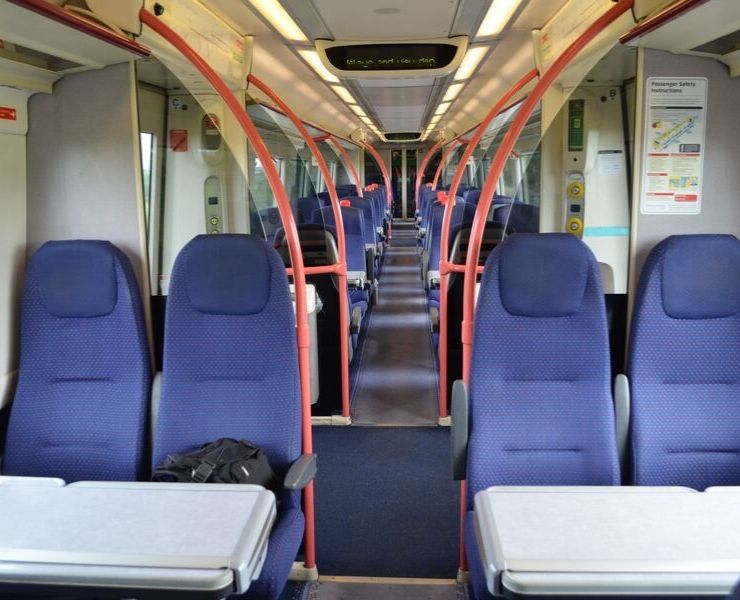

Enjoy your UK Train Travel Adventure
Want to chat about your UK train travel plans why not join our UK Train Travel Tips Group on Facebook! Chat to other travellers planning (or recently returned from) their UK vacation.
For more information about the different ways to get around the UK and help with itinerary planning our transportation guide includes tips and practical advice about how to travel the UK by car, train, plane, ferry, bus and more! Read our guide to how far ahead to book for the UK.
You can find more train travel inspiration for the UK our our top 10 train trips to take across Britain plus our 14-day Best of Britain by train itinerary.
UK TRAVEL PLANNING STEP-BY-STEP GUIDE
Click here for all the practical information and resources you need to help you plan your UK vacation – all your questions answered!

